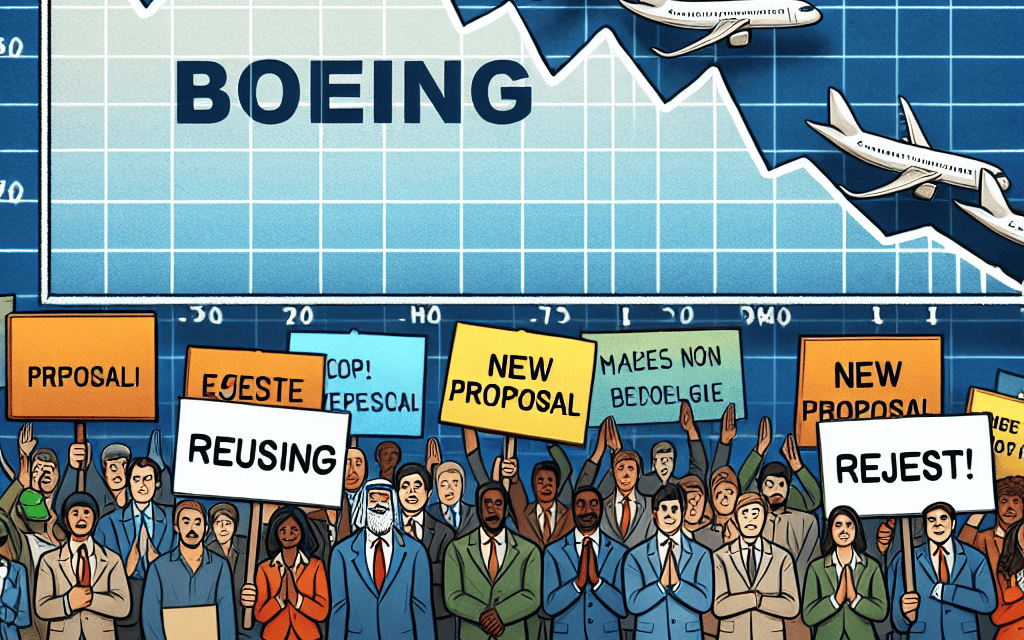“Boeing’s Stock Nosedives: Workforce Rejection Grounds New Proposal”
Introduction
Boeing’s stock experienced a notable decline following the rejection of a new labor proposal by its workforce, highlighting ongoing tensions between the aerospace giant and its employees. The proposal, which was aimed at addressing key issues such as wages, benefits, and working conditions, was turned down in a decisive vote, signaling dissatisfaction among the workers. This development has raised concerns about potential disruptions in Boeing’s production capabilities and its ability to meet delivery schedules, further impacting investor confidence. The stock drop reflects the market’s reaction to the uncertainty surrounding Boeing’s labor relations and the potential financial implications of prolonged negotiations or industrial action.
Impact Of Labor Disputes On Boeing’s Stock Performance
Boeing, a titan in the aerospace industry, has recently faced a significant challenge as its stock experienced a notable decline following the rejection of a new labor proposal by its workers. This development underscores the intricate relationship between labor disputes and stock performance, highlighting the broader implications for investors and the company’s future operations. The rejection of the proposal by Boeing’s workforce, primarily composed of skilled engineers and technicians, has raised concerns about potential disruptions in production and delivery schedules. Such disruptions can have a cascading effect on the company’s financial health, as delays in fulfilling orders may lead to penalties and strained relationships with clients. Consequently, investors are closely monitoring the situation, wary of the potential impact on Boeing’s revenue streams and overall market position.
The labor dispute at Boeing is not an isolated incident but rather part of a broader trend in the industry where workers are increasingly advocating for better wages, benefits, and working conditions. This shift in labor dynamics is partly driven by the post-pandemic economic landscape, where inflationary pressures and a tight labor market have emboldened workers to demand more from their employers. As a result, companies like Boeing are finding themselves in a delicate balancing act, striving to meet employee demands while maintaining operational efficiency and profitability.
In the case of Boeing, the rejection of the labor proposal has led to heightened uncertainty among investors, who are concerned about the potential for prolonged negotiations and the risk of a strike. A strike could severely disrupt Boeing’s operations, leading to significant financial losses and further eroding investor confidence. This uncertainty is reflected in the stock market, where Boeing’s shares have experienced volatility as investors react to the unfolding situation.
Moreover, the labor dispute has broader implications for Boeing’s competitive standing in the global aerospace market. As one of the leading manufacturers of commercial aircraft, Boeing operates in a highly competitive environment where timely delivery and reliability are crucial. Any disruptions in production could provide an advantage to competitors, such as Airbus, who may capitalize on Boeing’s challenges to capture a larger market share. This potential shift in market dynamics adds another layer of complexity to the situation, as Boeing must navigate both internal labor issues and external competitive pressures.
In response to the stock drop and ongoing labor dispute, Boeing’s management is likely to engage in strategic negotiations with the workforce to reach a resolution that satisfies both parties. This may involve revisiting the terms of the proposal, offering additional incentives, or exploring alternative solutions to address workers’ concerns. The outcome of these negotiations will be closely watched by investors, as it will provide insights into Boeing’s ability to manage labor relations and maintain operational stability.
In conclusion, the recent decline in Boeing’s stock following the rejection of a new labor proposal by its workers highlights the significant impact that labor disputes can have on a company’s financial performance and market position. As Boeing navigates this challenging period, the resolution of the labor dispute will be critical in determining the company’s future trajectory and its ability to remain competitive in the global aerospace industry. Investors and industry observers alike will be keenly observing how Boeing addresses these challenges, as the outcome will have far-reaching implications for the company’s long-term success.
Analyzing Boeing’s Recent Stock Volatility
Boeing’s stock has recently experienced notable volatility, a situation exacerbated by the rejection of a new proposal by its workforce. This development has sent ripples through the financial markets, prompting investors and analysts to reassess their positions on the aerospace giant. The rejection of the proposal, which was intended to address labor concerns and improve operational efficiency, has raised questions about Boeing’s ability to navigate its current challenges and maintain its competitive edge in the industry.
The proposal in question was designed to offer a revised compensation package and improved working conditions for Boeing’s employees. However, the workers’ decision to turn it down highlights underlying tensions between the company’s management and its labor force. This discord is not only a reflection of dissatisfaction with the proposed terms but also indicative of broader issues within the company that need to be addressed. As a result, the stock market has reacted unfavorably, with Boeing’s shares experiencing a decline as investors weigh the potential implications of prolonged labor unrest.
In the context of Boeing’s recent history, this development is particularly significant. The company has been grappling with a series of challenges, including the fallout from the 737 Max crisis, supply chain disruptions, and the impact of the COVID-19 pandemic on global air travel. These factors have collectively strained Boeing’s financial performance and operational capabilities. Consequently, the rejection of the proposal by its workforce adds another layer of complexity to an already challenging situation.
Moreover, the stock market’s reaction underscores the importance of labor relations in the aerospace industry. Investors are acutely aware that a harmonious relationship between management and employees is crucial for maintaining productivity and ensuring the timely delivery of aircraft. Any disruptions in this relationship can lead to delays, increased costs, and ultimately, a loss of confidence among customers and stakeholders. Therefore, the rejection of the proposal has heightened concerns about Boeing’s ability to meet its production targets and fulfill its commitments to clients.
Transitioning to the broader implications, this situation also highlights the delicate balance that companies must strike between cost management and employee satisfaction. In an industry characterized by high fixed costs and intense competition, maintaining a motivated and engaged workforce is essential for long-term success. Boeing’s experience serves as a reminder that addressing labor concerns is not merely a matter of financial negotiation but also involves fostering a culture of trust and collaboration.
Looking ahead, Boeing’s management faces the challenge of rebuilding this trust and finding a resolution that satisfies both the company’s strategic objectives and the needs of its workforce. This will likely involve revisiting the terms of the proposal and engaging in more comprehensive dialogue with employee representatives. Additionally, the company may need to explore innovative approaches to workforce management that align with evolving industry dynamics and employee expectations.
In conclusion, Boeing’s recent stock volatility, driven by the rejection of a new proposal by its workers, underscores the critical role of labor relations in the aerospace sector. As the company navigates this complex landscape, it must prioritize rebuilding trust with its workforce while addressing the broader challenges it faces. The outcome of these efforts will not only impact Boeing’s financial performance but also shape its reputation and competitiveness in the global market. Investors and industry observers will be closely monitoring how Boeing responds to this situation, as it will provide valuable insights into the company’s future trajectory.
The Role Of Employee Negotiations In Corporate Valuation
Boeing’s stock recently experienced a notable decline following the rejection of a new proposal by its workers, highlighting the intricate relationship between employee negotiations and corporate valuation. This development underscores the critical role that labor relations play in shaping investor perceptions and, consequently, the market value of a company. As negotiations between management and employees unfold, they can significantly influence a company’s operational stability and financial outlook, which are key factors that investors consider when assessing a company’s worth.
The rejection of the proposal by Boeing’s workforce serves as a reminder of the power that employees hold in negotiations, particularly in industries where skilled labor is essential to maintaining production and quality standards. In this context, the decision by workers to turn down the proposal can be seen as a strategic move to leverage their bargaining power in pursuit of better terms. This, in turn, can create uncertainty for investors, who may perceive the potential for disruptions in production or increased labor costs as risks to the company’s profitability.
Moreover, the dynamics of employee negotiations are often closely watched by the market, as they can provide insights into the broader health of a company. For instance, a successful negotiation that results in a mutually beneficial agreement can signal to investors that the company is effectively managing its labor relations, which can enhance its reputation and stability. Conversely, a breakdown in negotiations, as seen in Boeing’s case, can raise concerns about potential operational challenges and financial implications, leading to a decline in stock value.
In addition to the immediate impact on stock prices, employee negotiations can also have long-term effects on corporate valuation. Companies that are able to foster positive relationships with their workforce may benefit from increased productivity, lower turnover rates, and enhanced employee morale, all of which contribute to a stronger competitive position in the market. On the other hand, prolonged labor disputes or dissatisfaction among employees can lead to disruptions in operations, damage to the company’s brand, and ultimately, a decrease in shareholder value.
Furthermore, the outcome of employee negotiations can influence investor confidence in a company’s leadership and strategic direction. Effective management of labor relations is often viewed as a reflection of a company’s overall governance and decision-making capabilities. Therefore, the ability of a company’s leadership to navigate complex negotiations and reach agreements that align with both employee and corporate interests is crucial in maintaining investor trust and confidence.
In conclusion, the recent decline in Boeing’s stock following the rejection of a new proposal by its workers illustrates the significant impact that employee negotiations can have on corporate valuation. As companies navigate the complexities of labor relations, they must consider the implications of these negotiations on their financial performance and market perception. By understanding the interconnectedness of employee negotiations and corporate valuation, companies can better position themselves to achieve sustainable growth and maintain investor confidence in an increasingly competitive business environment.
Boeing’s Financial Strategies Amidst Workforce Challenges

Boeing’s financial strategies have come under scrutiny as the company faces significant challenges with its workforce, leading to a notable drop in its stock value. Recently, Boeing’s stock experienced a decline following the rejection of a new proposal by its workers, highlighting the intricate relationship between labor negotiations and financial performance. This development underscores the importance of effective workforce management in maintaining investor confidence and ensuring the company’s long-term stability.
The proposal in question was aimed at addressing several key issues, including wage adjustments, benefits, and working conditions. However, the workers’ decision to turn down the offer reflects underlying dissatisfaction and concerns that have yet to be adequately addressed by Boeing’s management. This rejection not only signals potential disruptions in production but also raises questions about the company’s ability to navigate labor relations effectively.
In the context of Boeing’s broader financial strategies, the rejection of the proposal poses a significant challenge. The company has been striving to recover from previous setbacks, including the grounding of the 737 Max and the impact of the COVID-19 pandemic on the aviation industry. As part of its recovery plan, Boeing has been focusing on cost-cutting measures, streamlining operations, and investing in new technologies to enhance its competitive edge. However, the recent labor dispute suggests that these strategies may need to be recalibrated to account for the critical role of its workforce in achieving these objectives.
Moreover, the stock drop serves as a reminder of the interconnectedness between labor relations and investor sentiment. Investors closely monitor labor negotiations, as unresolved disputes can lead to production delays, increased costs, and ultimately, a negative impact on the company’s financial performance. Consequently, Boeing’s management must prioritize resolving these issues to restore confidence among investors and stakeholders.
In light of these challenges, Boeing may need to adopt a more collaborative approach in its negotiations with workers. Engaging in open dialogue and addressing the core concerns of its workforce could pave the way for a mutually beneficial agreement. By fostering a positive work environment and ensuring fair compensation, Boeing can enhance employee satisfaction and productivity, which are crucial for sustaining its competitive position in the aerospace industry.
Furthermore, the situation highlights the need for Boeing to balance short-term financial goals with long-term workforce stability. While cost-cutting measures may provide immediate relief, they should not come at the expense of employee morale and retention. Investing in workforce development and creating opportunities for career advancement can contribute to a more resilient and motivated workforce, ultimately supporting Boeing’s strategic objectives.
In conclusion, Boeing’s recent stock drop following the rejection of a new proposal by its workers underscores the critical importance of effective workforce management in the company’s financial strategies. As Boeing navigates these challenges, it must prioritize resolving labor disputes and fostering a positive work environment to maintain investor confidence and ensure long-term stability. By adopting a more collaborative approach and balancing short-term financial goals with workforce stability, Boeing can position itself for sustained success in the competitive aerospace industry.
Investor Reactions To Boeing’s Labor Proposal Rejection
Boeing’s stock recently experienced a notable decline following the rejection of a new labor proposal by its workers, a development that has sparked considerable attention among investors. The aerospace giant, already navigating a complex landscape of challenges, now faces additional uncertainty as it grapples with labor relations. This rejection has not only impacted the company’s stock performance but also raised questions about its future operational stability and investor confidence.
The proposal in question was intended to address several key issues, including wage increases, benefits, and working conditions. However, the workers’ decision to turn down the offer underscores a significant disconnect between the company’s management and its workforce. This discord comes at a time when Boeing is striving to recover from previous setbacks, including the grounding of its 737 MAX aircraft and the broader impacts of the COVID-19 pandemic on the aviation industry. Consequently, the rejection has intensified concerns about potential disruptions in production and delivery schedules, which are critical to Boeing’s financial recovery and growth prospects.
Investors, naturally sensitive to any developments that could affect a company’s bottom line, have reacted to this news with caution. The stock market’s response reflects a broader apprehension about Boeing’s ability to maintain its competitive edge in an industry that is gradually rebounding from the pandemic’s effects. The labor proposal’s rejection suggests potential delays in achieving operational efficiencies, which are crucial for meeting the increasing demand for commercial aircraft as global travel resumes. Moreover, the possibility of prolonged negotiations or even strikes could exacerbate these challenges, further unsettling investors.
In light of these developments, analysts are closely monitoring Boeing’s next steps in addressing the concerns of its workforce. The company’s ability to swiftly and effectively negotiate a new agreement will be pivotal in restoring investor confidence. A successful resolution could mitigate the risk of production disruptions and reassure stakeholders about Boeing’s commitment to maintaining a harmonious relationship with its employees. Conversely, prolonged labor disputes could lead to further stock volatility and erode trust in the company’s management.
Furthermore, this situation highlights the broader implications of labor relations in the aerospace industry. As companies like Boeing strive to balance cost management with employee satisfaction, the outcomes of such negotiations can set precedents for the entire sector. Investors are keenly aware of this dynamic, as it influences not only individual companies but also the competitive landscape as a whole. Therefore, Boeing’s handling of this labor proposal rejection will likely be scrutinized as a case study for other industry players facing similar challenges.
In conclusion, Boeing’s stock drop following the rejection of its labor proposal serves as a stark reminder of the intricate interplay between labor relations and investor sentiment. As the company navigates this complex situation, its actions will be closely watched by investors and industry analysts alike. The resolution of this issue will not only impact Boeing’s immediate financial performance but also shape perceptions of its long-term strategic direction. Ultimately, the company’s ability to reconcile the interests of its workforce with those of its shareholders will be crucial in determining its future trajectory in the competitive aerospace market.
Long-term Implications Of Workforce Decisions On Boeing
Boeing, a titan in the aerospace industry, recently faced a significant setback as its stock experienced a notable decline following the rejection of a new labor proposal by its workforce. This development has sparked discussions about the long-term implications of workforce decisions on the company’s future. The rejection of the proposal, which was intended to address various labor concerns, underscores the complex relationship between Boeing and its employees, a dynamic that is crucial to the company’s operational success and financial stability.
The decision by Boeing’s workers to turn down the proposal highlights the growing tension between labor and management, a situation that is not unique to Boeing but prevalent across many industries. This tension often stems from differing priorities; while management focuses on cost efficiency and shareholder value, employees are concerned with job security, fair compensation, and working conditions. The failure to reach an agreement can lead to disruptions in production, delays in project timelines, and ultimately, a negative impact on the company’s bottom line.
Moreover, the rejection of the proposal could have far-reaching consequences for Boeing’s competitive position in the global aerospace market. As the company grapples with internal challenges, competitors may seize the opportunity to capture market share. This is particularly concerning in an industry where technological advancements and timely delivery are critical to maintaining a competitive edge. The potential for production slowdowns or strikes could hinder Boeing’s ability to meet customer demands, thereby affecting its reputation and customer loyalty.
In addition to immediate operational challenges, the workforce’s decision may also influence Boeing’s strategic direction in the long term. Companies often rely on their workforce to drive innovation and efficiency, and a disengaged or dissatisfied workforce can stifle these efforts. The rejection of the proposal may prompt Boeing to reevaluate its approach to labor relations, potentially leading to a shift in corporate culture and management practices. This could involve more collaborative efforts to address employee concerns, fostering a more inclusive environment that values employee input and engagement.
Furthermore, the stock market’s reaction to the proposal’s rejection reflects investor sentiment regarding Boeing’s ability to manage its workforce effectively. Investors are keenly aware that a harmonious relationship between labor and management is essential for sustained growth and profitability. The decline in stock value serves as a reminder of the financial risks associated with labor disputes and the importance of proactive measures to mitigate these risks.
In light of these developments, Boeing must navigate a delicate balance between addressing employee concerns and maintaining operational efficiency. This may involve revisiting the terms of the proposal, engaging in more transparent communication with employees, and exploring innovative solutions to meet both parties’ needs. By doing so, Boeing can work towards restoring confidence among its workforce and investors, ultimately strengthening its position in the aerospace industry.
In conclusion, the rejection of Boeing’s labor proposal and the subsequent drop in stock value underscore the significant impact workforce decisions can have on a company’s long-term prospects. As Boeing moves forward, it must prioritize building a more collaborative relationship with its employees to ensure continued success in an increasingly competitive market. Through strategic adjustments and a commitment to addressing workforce concerns, Boeing can turn this challenge into an opportunity for growth and innovation.
Comparing Boeing’s Labor Relations With Industry Peers
Boeing’s recent stock decline, following the rejection of a new labor proposal by its workers, has brought the company’s labor relations into sharp focus. This development invites a comparison with its industry peers, shedding light on how labor dynamics can significantly impact a company’s financial health and operational stability. The aerospace giant, known for its pivotal role in the global aviation industry, has faced numerous challenges in recent years, from production setbacks to regulatory scrutiny. However, labor relations remain a critical aspect that can either bolster or undermine its market position.
In the competitive aerospace sector, effective labor relations are crucial for maintaining a steady production line and ensuring timely delivery of products. Boeing’s recent struggles highlight the importance of aligning corporate strategies with workforce expectations. The rejection of the new proposal by Boeing’s workers underscores a disconnect that can lead to operational disruptions. This situation contrasts with some of Boeing’s industry peers, who have managed to foster more harmonious labor relations, thereby ensuring smoother operations.
For instance, Airbus, Boeing’s primary competitor, has often been cited for its collaborative approach to labor relations. The European aerospace company has historically engaged in proactive dialogue with its workforce, involving them in decision-making processes and addressing concerns before they escalate. This approach has not only minimized labor disputes but also enhanced employee morale and productivity. By maintaining open channels of communication, Airbus has been able to navigate challenges more effectively, thereby avoiding the kind of stock volatility currently experienced by Boeing.
Similarly, Lockheed Martin, another key player in the aerospace industry, has demonstrated the benefits of strategic labor management. The company has invested in comprehensive training programs and career development opportunities for its employees, fostering a sense of loyalty and commitment. This investment in human capital has paid dividends, as evidenced by the relatively stable labor relations and minimal disruptions in production schedules. Lockheed Martin’s approach highlights the importance of viewing employees as valuable assets rather than mere resources, a perspective that can lead to more sustainable business practices.
In contrast, Boeing’s recent labor proposal rejection points to potential areas for improvement in its labor relations strategy. The company’s focus on cost-cutting measures and efficiency gains may have inadvertently strained its relationship with the workforce. To regain stability, Boeing might consider adopting a more inclusive approach, similar to its peers, by engaging employees in meaningful dialogue and addressing their concerns comprehensively. This could involve revisiting the terms of the proposal, offering more competitive compensation packages, or enhancing job security measures.
Moreover, the broader implications of Boeing’s labor relations extend beyond immediate financial impacts. In an industry where reputation and reliability are paramount, maintaining positive labor relations is essential for long-term success. Investors and stakeholders closely monitor how companies manage their workforce, as labor disputes can lead to production delays and affect customer satisfaction. Therefore, Boeing’s ability to resolve its current labor issues will be crucial in restoring investor confidence and stabilizing its stock performance.
In conclusion, Boeing’s recent stock drop serves as a reminder of the critical role that labor relations play in the aerospace industry. By examining the strategies employed by its peers, Boeing can glean valuable insights into fostering a more collaborative and productive relationship with its workforce. As the company navigates this challenging period, prioritizing effective labor management will be key to ensuring its continued success and competitiveness in the global market.
Q&A
1. **What caused Boeing’s stock to drop?**
Boeing’s stock dropped due to workers rejecting a new labor proposal.
2. **Which group of workers rejected the proposal?**
The proposal was rejected by Boeing’s unionized workers.
3. **What was the main reason for the workers’ rejection of the proposal?**
Workers rejected the proposal primarily due to dissatisfaction with wage increases and benefits.
4. **How did the stock market react to the news of the proposal rejection?**
The stock market reacted negatively, leading to a decline in Boeing’s stock price.
5. **What impact does the rejection have on Boeing’s operations?**
The rejection could lead to potential disruptions in production and delays in meeting delivery schedules.
6. **What are the potential long-term effects on Boeing if the labor dispute continues?**
Prolonged labor disputes could harm Boeing’s financial performance, damage its reputation, and affect its competitive position in the aerospace industry.
7. **What steps might Boeing take to address the workers’ concerns?**
Boeing might renegotiate terms with the union, offering better wages, benefits, or working conditions to reach an agreement.
Conclusion
Boeing’s stock decline following the rejection of a new proposal by its workers highlights the significant impact labor relations can have on investor confidence and market performance. The refusal of the proposal suggests ongoing tensions and potential disruptions in Boeing’s operations, which can lead to delays in production and increased costs. This uncertainty can deter investors, leading to a decrease in stock value. The situation underscores the importance of effective negotiation and communication between management and labor to ensure stability and maintain investor trust.





